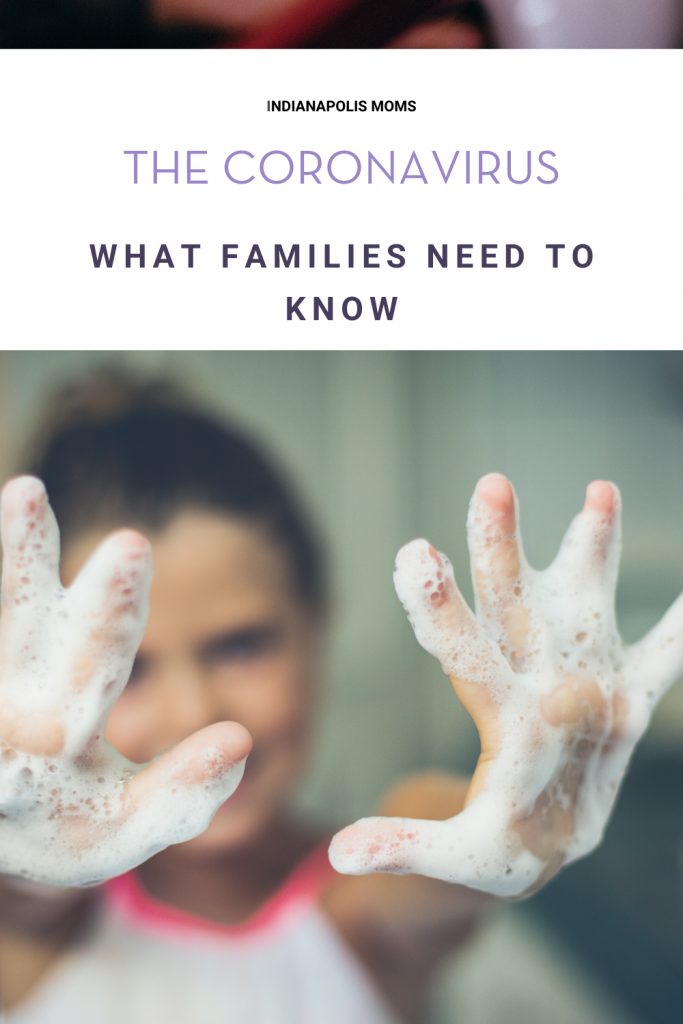Earlier this week, my first-grader came home from school, recounting the reminders he’d received that day about the importance of washing his hands and covering his mouth. “Also,” he said, “my friend said lots of people are dying.”
Wonderful. That wasn’t really how I wanted to start my discussions about the Coronavirus. Now, a few days later, the virus” first case in Indianapolis has been confirmed. Social media is flooded with images of empty grocery store shelves, conferences and vacations are being cancelled, and we’re eyeing anyone who sneezes with suspicion.
As I talk to the other parents in my circle, it seems we all want to be responsible and prepared, but we don’t want to overreact, either. We’re on the hunt for the middle ground and the common-sense approach.
What do Indianapolis parents need to know about Coronavirus, and how do we talk to our kids about it?
Five things to know about Coronavirus:
- Coronaviruses are not uncommon and are sometimes the cause of your typical common cold. The strain we are dealing with now, however, is different (thus the moniker “novel coronavirus”), and is causing a disease called COVID-19. COVID stands for coronavirus disease.
- Symptoms include running nose, dry cough, fever, and shortness of breath. In the elderly or other people at greater-than-normal risk for illness, it sometimes leads to pneumonia or other more severe illnesses.
- COVID-19 is passed person-to-person, and it seems that an infected person is contagious even if they haven’t yet shown any symptoms. That’s at least part of the reason why the disease is spreading so quickly and easily.
- Compared to adults, very few children are getting sick, and most pediatric cases seem to be mild. (Of course, kids with compromised immune systems and newborns are still at higher risk.) As a mom, this was the most comforting thing to know. Most cases are in people 60 years old and up.
- The best way to stop the spread of the disease is to wash your hands. Avoid touching your face, sneeze or cough into your arm or a tissue, and, yes, wash your hands! (If you haven’t heard this already, teach your kids to scrub for about as long as it takes them to sing the ABCs– about 20 seconds.)
Why is Coronavirus a big deal?
COVID-19 is spreading rapidly. While symptoms can be mild, it is dangerous for vulnerable populations (like the sick and elderly). Health officials and scientists have said the spread is inevitable, so wash your hands and stay home if you don’t feel well.
Lots of comparisons are being drawn between COVID-19 and other diseases, and stats are changing by the minute. Still, the World Health Organization’s best estimate is that this disease is more likely to be fatal than your average flu.
Should I be stockpiling?
Don’t panic. You don’t need ten gallons more hand soap than you would typically buy. Look at this as an excellent excuse to get your emergency supplies in order, or perhaps gather a few weeks of nonperishables, so you don’t need to shop if you (or others) are sick. But don’t go crazy, and remember that more vulnerable members of our community may rely on supplies being available– don’t hoard what you don’t need. (Also, wash your hands.)
When should I go to the doctor?
According to the CDC, you should call your doctor in one of two circumstances:
- You have symptoms like cough, fever, or trouble breathing AND you have traveled to an infected area or been around someone you know is infected.
- You have been exposed to someone with a confirmed case.
Before you show up, call ahead so the staff can make preparations to ensure you don’t spread your germs!
Resources for talking to your kids about COVID-19:
NPR published a comic by artist Malaka Gharib that explains the virus in kid-friendly language. It even includes instructions for printing and making a mini-zine, and it is available in Chinese! I read this to my boys (ages 6 and 4), and though some of it went over their heads, it also answered many of their questions.
The Indianapolis Public Library has linked to a variety of helpful resources for kids and families, including a list of picture books.
Brain POP released a free cartoon explaining viruses and the facts around COVID-19. It is probably best for upper-elementary school kids.
PBS KIDS also released a really approachable guide to talking to your kids about the outbreak, including links to relevant PBS KIDS shows and videos. The National Association of School Psychologists has a similar guide, but it may be more helpful to parents of middle and high schoolers.
Now what?
Now that the coronavirus outbreak has reached Indiana, it is good to be prepared and know what we’re up against. It is hard to know how long this will last or how far it will spread. But in the meantime, remember that as parents, we get to set the tone in our homes. Our calm and level-headedness will go a long way toward putting our kids at ease.
And on the bright side, my preschooler will really know his ABCs by the time this is all over.
Excuse me while I go wash my hands.









